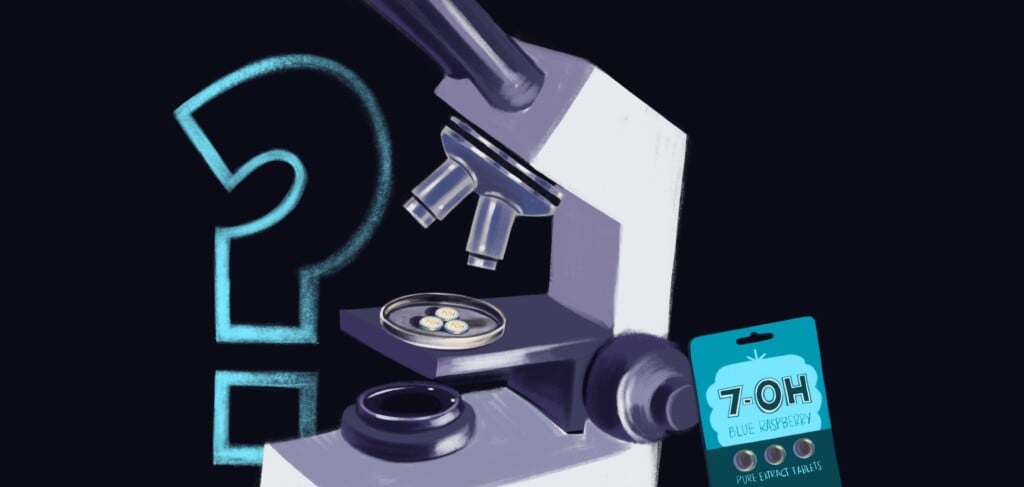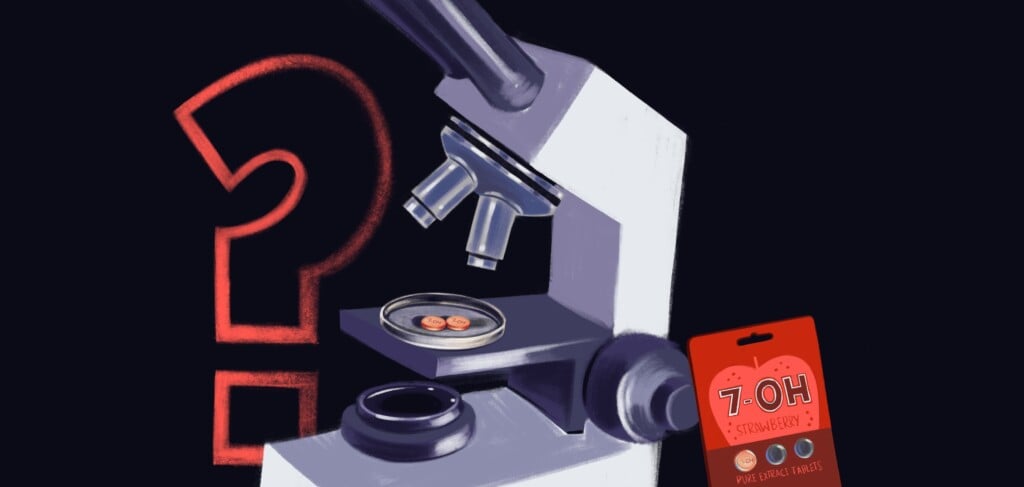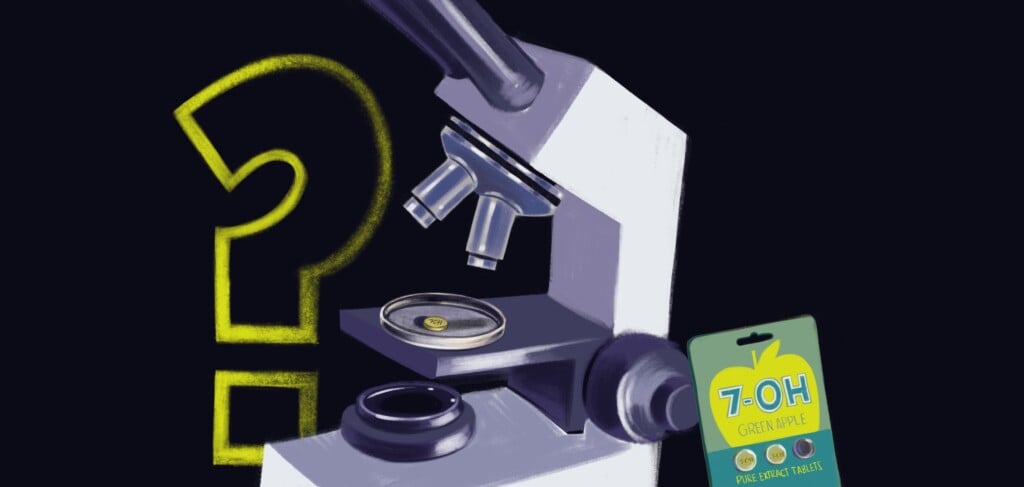Inside the kratom industry’s 7-OH tug of war between profits and public safety
This is the first article of a three-part series regarding 7-OH and the billion-dollar industry expanding atop the kratom extract. The second article of the series will be published tomorrow morning at 8:00 a.m.
What once functioned as a method to relieve pain and maybe catch a slight buzz has now unraveled into severe addiction and harrowing withdrawal. We’re talking about kratom. But not your typical leaf or powder. There is a new form of this alternative “care”, and it’s called 7-OH.
There are numerous alkaloids within the kratom leaf that make up its chemical composition—one of which is 7-hydroxymitragynine, also known as 7-OH and 7-hydroxy. Within naturally growing kratom, small amounts of 7-OH exist, which, when using traditional kratom, contribute to pain relief, subtly tapping an individual’s opioid receptors.
However, members of the kratom industry have seemingly ditched the conventional product and extracted 7-OH from the plant, then highly concentrated it to be sold as its own sole product.
The product itself comes in various forms—pills, tablets, liquid shots, with a variety of recommended serving sizes and dosages. And it all started in our backyard.
CBD American Shaman, the Vince Sanders-owned hemp wellness shop, first opened its doors to the public in Topeka in 2017. Now, there are hundreds of locations throughout the nation, with plenty spread out throughout the Kansas City metro. Alongside the opening of the retail brick-and-mortars came the founding of Shaman Botanicals, the manufacturer of the shop’s alternative wellness products, as well as other retailers around the country.
Located on Southwest Boulevard, Sanders’ employees have been crafting and distributing 7-OH products for a couple of years. He says that Shaman Botanicals was the first manufacturer of the product. In a Kansas City Star three-part series regarding Sanders’ businesses and 7-OH, he said, “Our cannabis business is about $100 million a year. And our 7-OH business is now significantly larger than that.”
Since the company began producing the highly concentrated 7-OH, there has been a stir about the product’s safety and how it is currently being sold to Americans.
As of right now, 7-OH is not scheduled under the Controlled Substances Act, and there is no formal federal regulation over the sale of the product. In late July, the FDA held a press conference, suggesting that the DEA classify the product as a Schedule I substance, just a few days after one of the largest kratom tradeshows, CHAMPS, took place in Las Vegas, where Kansas City Star Reporter David Hudnall says half of the 400 vendors were selling a version of the product.
Along with the press conference, the FDA has sent warning letters to companies selling these products; six of the seven that were noticed received products from Shaman Botanicals.
Since the press conference and letters, two locals around the metro filed a class-action lawsuit against American Shaman, claiming the company has misled consumers by marketing products containing 7-OH. Even more recently, the Missouri Department of Health and Senior Services (DHSS) issued a statewide health advisory associated with 7-OH.
Following the FDA’s announcement and the trade show, which Sanders participated in, Hudnall and The Star published a three-part series on 7-OH, specifically focusing on Sanders and his two businesses. Having followed the topic for some time, The Pitch sat down with the founder, multiple 7-OH users, as well as kratom research professionals to paint the clearest picture possible of the current state of 7-OH in Missouri and the United States.
Popping the Pill
Let’s take a step back for a moment and evaluate how we got to the forefront of federal agencies condemning 7-OH and the emergence of lawsuits against companies that sell the product.
Individuals around the nation who seek alternative forms of care have been using kratom for years. That is nothing new. Since its inception, American Shaman and other nontraditional wellness shops have garnered their customer demographic.
Operating hundreds of locations throughout the country, success requires a high demand. There are numerous consumers throughout the nation who would say that they have received health benefits from using kratom products. So, when something has been working for you for years, why venture off and try something new?
For users of kratom and 7-OH, there seems to be a consensus that uncomfortable nausea is one of the many effects that come with consuming kratom. For an already avid kratom user, a product that gives all of the same benefits that traditional kratom offers without the queasiness toll is enticing. In steps 7-OH.
“This is basically taking the chemicals that work and leaving all the 30-plus other things that are in kratom out of it,” says John Barnes, a 51-year-old retired real estate appraiser in Kansas City.
Joseph Valentino, a 33-year-old manager at a Sonic location in Memphis, says that he had been taking kratom regularly when a friend recommended 7-OH to him in May. He made the switch when he learned that the stomach discomfort was not present in the product’s effects.
An anonymous 44-year-old part-time weightlifting coach based out of Atlanta, who will be referred to as Jane for the story, says that she initially began taking kratom as a pain reliever because it doesn’t show up on drug tests for competitions that she competes in. Due to the nauseousness that kratom brings, she turned to 7-OH in January.
In terms of what 7-OH can do for an individual in comparison to regular kratom products, American Shaman and American Botanicals Founder Vince Sanders says it is “like going from walking to a jet plane.”
In speaking with individuals who regularly consume or have regularly consumed 7-OH, many say that they use it as a form of pain relief, with some having long-standing histories of using opioids and other prescribed medications from their respective doctors. The substance is advertised as a pain reliever and a mood/energy elevator.
There are multiple reasons why these individuals choose to indulge in the unregulated product. An obvious justification is that it has yielded greater results in terms of reducing their pain, in comparison with opioids such as oxycodone, hydrocodone, morphine, codeine, and others.
Barnes, who has dealt with numerous forms of chronic pain and been prescribed various medications to manage it, says taking 7-OH is different from any of the other pain meds that he had previously taken. It gives him energy, he is clear-minded, and “actually aware of things going on.”
Chris Morgan, a local 50-year-old foreman for a tree trimming company, says that his wife has been dealing with chronic back pain for years. When it comes to treating the pain, he says that traditional healthcare avenues have never sufficed, which is what led the couple to indulge in 7-OH.
“The doctors and hospitals and all that stuff, they don’t even help her to begin with, they don’t give her anything to help her,” Morgan says. “So we’ve always had to go outside the box to find stuff.”
An anonymous 26-year-old healthcare worker in Kansas City, who will be referred to as Mary for the story, says that, after being prescribed oxycodone for her arthritis and bulging discs in her back, her life “was just debilitated.”
It wasn’t until a friend recommended she try 7-OH when she got off her oxy prescription in March and began using the alternative care.
“It completely alleviates it, [as good as], if not better, than an oxycodone,” Mary says.
Another motive that became clear throughout the interview process with these individuals is the fact that some have lost faith in the traditional healthcare system.
Getting off of traditional pain medications and switching to this holistic healing has been a “sense of freedom” from the pharmaceutical industry for Mary.
LaQuita Rabanal, a local 57-year-old speech pathologist, has been a longtime patron of American Shaman on 87th and Switzer in Overland Park, regularly purchasing their CBD products. After being on many different pain medications for over a decade to deal with chronic back pain, she was introduced to 7-OH by one of the employees at the brick-and-mortar. She says that the transition to the alternative care stems from lost confidence in Western medicine.
“It kind of got to the point where it’s like, I’m so fed up with Big Pharma, so to speak, and the fact that I feel like I was misled by a doctor for gosh sake and kept on opiates for 13 flipping years,” she says.
An anonymous 47-year-old software developer out of Austin, who will be referred to as Tim for the story, says his introduction to the product was through a free online sample. With history using kratom, his friend recommended he give 7-OH a try.
Tim says that he had not used any drugs other than cannabis prior to kratom and 7-OH, and that his choice to pick up 7-OH for the first time was simply out of recreational curiosity.
Point of Sale
Each of the four individuals located in Kansas City, Barnes, Morgan, Rabanal, and Mary, says that they strictly purchase their products from American Shaman locations. All say that they have had to show a valid form of identification and fill out consent forms to purchase their products. Both Rabanal and Mary say they spend around $300 a month on 7-OH, typically taking advantage of American Shaman’s discounts on the products. All of them say that they never felt misled during the point of sale process. Rabanal was the only customer of these four who says they received a free sample as their introduction to 7-OH.
“I feel like they know their stuff. I feel like they know their research,” Rabanal says. “They obviously very much have some kind of respect for their own products. They cautioned me about taking 7-OH from your gas station and smoke shops.”
But that caution didn’t quite stick, as Rabanal decided to purchase 7-OH from a retailer in Hawaii when on vacation. She says that she had a different, adverse reaction to the product than when she had taken 7-OH from American Shaman retailers.
For Jane, Tim, and Valentino, all three say that they have purchased their substances from gas stations, local vape shops, and online retailers, such as Hydroxy and VII. Each says that they have never had to show any valid form of identification or fill out any consent forms to obtain the product. Tim was the only one of the three to receive a free sample of the product as an introduction.
All of the users interviewed said that they use or have used mainly pills and tablets, with some saying that they have tried the shot form. Each of the users also says that they started out with the normal serving size, which, according to American Shaman’s packaging, is one 7.5mg tablet, although this varies for users who purchased products from other distributors.
For all four of the customers located within the metro, they say that there have been times when they take more than the recommended dosage, yet never exceed about four or five doses a day. As a healthcare professional, Mary says that she is very intentional about remaining within the recommended dosage frame, as she understands how quickly pain tolerance can be built to certain substances.
“I just take it as the bottle says to, because, if you’re in chronic pain, you cannot abuse things, or else your pain tolerance will be messed up,” she says.
This is where a large part of the issue with the substance stems from: its potentially addictive nature. While these four American Shaman customers say that they don’t feel like they have fallen victim to 7-OH addiction, the three out-of-state interviewees claim that they have undergone incredibly traumatic experiences due to dependency on the substance. And they aren’t the only ones making this case.








